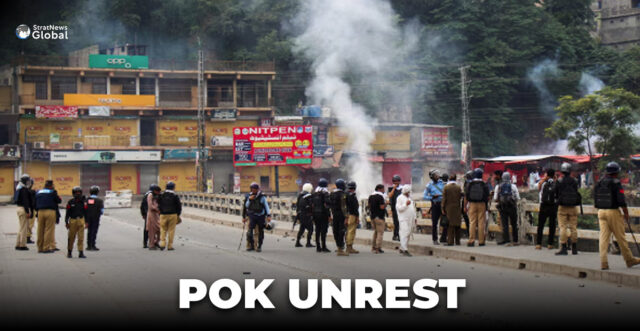At least 12 civilians were killed after Pakistani security forces opened fire on demonstrators in Pakistan-occupied Kashmir (PoK), which is experiencing one of its most intense waves of unrest in recent years.
Three policemen were also killed in the clash.
Initially triggered by the government’s failure to meet 38 key demands, the agitation has expanded into a larger movement against military excesses, paralysing the region.
Deadly Clashes
On Thursday, the third consecutive day of protests, clashes erupted in Dadyal as the government deployed thousands of additional troops to contain the situation. Violence has spread beyond Muzaffarabad to Rawalakot, Neelum Valley, and Kotli.
Reports indicate that five protesters were killed in Muzaffarabad, another five in Dheerkot, and two in Dadyal. At least three policemen have also lost their lives. More than 200 people have been injured, many critically, with gunshot wounds making up the bulk of casualties.
The demonstrations, organised by the Jammu Kashmir Joint Awami Action Committee (JKJAAC), have brought daily life to a halt.
Protesters are demanding the abolition of 12 assembly seats in PoK reserved for Kashmiri refugees living in Pakistan, as well as tax relief, subsidies on flour and electricity, and completion of long-pending development projects.
Since the protests began on September 29, shops, markets, and businesses have been shuttered. Authorities have also cut off mobile, internet, and landline services, further isolating the region.
‘Kashmir Is Ours’
Videos circulating on social media show massive crowds hurling stones and dismantling shipping containers placed on bridges to block marches in Muzaffarabad.
In other towns, demonstrators defied curfews, chanting slogans such as “Rulers, beware, we are your doom” and “Kashmir is ours, we will decide its fate.”
Analysts note this marks a rare moment in decades where PoK residents are directly challenging both Islamabad and the military establishment.
Sharif Government Under Pressure
Prime Minister Shehbaz Sharif voiced “deep concern” over the deteriorating law and order in PoK and expanded a negotiation panel tasked with finding a way out of the crisis.
His office announced that a transparent probe had been ordered into the shootings, while also urging security forces to exercise restraint.
Sharif, currently in London following a U.S. visit, appealed for peace and said his government was prepared to address the protesters’ concerns through dialogue.
Meanwhile, Nasir Aziz Khan, spokesperson of the United Kashmir People’s National Party (UKPNP), has called for urgent intervention from the United Nations and the wider international community.
Speaking at the UN Human Rights Council’s 60th session in Geneva, Khan warned of an impending humanitarian disaster in PoK and reminded member states of their treaty obligations.
The unrest in PoK comes on the heels of another tragedy last week, when 30 civilians were killed in Pakistan Air Force airstrikes in Khyber Pakhtunkhwa, further underscoring the volatile situation across the country.
Pak Police Assault Journalists
Pakistani police stormed Islamabad’s National Press Club, assaulting journalists and protesters who were demonstrating against atrocities and the ongoing internet shutdown in violence-hit PoK.
The incident sparked widespread outrage across Pakistan, prompting Interior Minister Mohsin Naqvi to order an investigation.
Footage from the scene showed officers hitting journalists with batons and damaging media equipment at the press club, situated in the heart of the capital.
The crackdown occurred while a group of lawyers from the JKJAAC, which is leading the protests in PoK, was holding a peaceful demonstration.
According to Arab News, the government claimed the violence erupted after protesters clashed with police outside the building, with some retreating into the press club.
Police then conducted a lathicharge inside the premises, targeting both protesters and journalists. Videos also show officers forcibly dragging some demonstrators out of the club.
First Round Of Talks
A delegation from the Pakistan federal government held the first round of talks with the protesters on Thursday.
After the talks, federal minister Ahsan Iqbal addressed the media, urging protesters to refrain from actions that could serve the interests of Pakistan’s adversaries.
“Our enemy will seize any opportunity to exploit a crisis in our country. We must avoid igniting a fire that could harm Pakistan’s image, trigger unrest, or endanger lives and property,” Iqbal was quoted as saying by Arab News.
India Delivers Hammer Blow
India on Friday described the large-scale deadly protests in PoK as a “natural outcome of Pakistan’s oppressive policies and systematic exploitation of the region’s resources.”
Speaking at a weekly media briefing in New Delhi, Ministry of External Affairs (MEA) spokesperson Randhir Jaiswal said India was closely monitoring the ongoing demonstrations and the reported brutalities by Pakistani forces against local civilians.
“We have observed reports of protests across several areas of Pakistan-occupied Jammu and Kashmir, along with the atrocities committed by Pakistani forces on innocent people. This unrest is a predictable result of Pakistan’s repressive governance and its systematic plundering of resources in territories under its illegal occupation. Pakistan must be held accountable for these grave human rights violations,” Jaiswal said.
Reiterating India’s position, the MEA spokesperson stressed that Jammu and Kashmir, along with Ladakh, will always remain an integral part of India.
“Jammu and Kashmir and Ladakh are inalienable parts of India and always have been. These territories under Pakistan’s control are our inalienable part,” he added.
(With inputs from IBNS)





